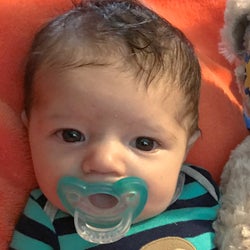R.J. Holcomb
March 16, 2020
Categories: Patient Stories
Tags: Dextrocardia, Heterotaxy, Pulmonary Atresia, Dextrocardia, Heterotaxy, Pulmonary Atresia
Dextrocardia, Heterotaxy, Pulmonary Atresia
When Robert James “R.J.” Holcomb was born, parents Craig and Michelle felt like they didn’t have a worry in the world. But doctors soon realized something wasn’t right. R.J.’s legs, feet, and fingers were purple and blue. He was placed on oxygen and X-rays revealed R.J.’s heart was backwards. R.J. underwent testing and was officially diagnosed with dextrocardia – a rare congenital heart condition. Testing also revealed R.J.’s lungs weren’t connected to his heart. He had pulmonary atresia, meaning his pulmonary valve wasn’t formed properly, as well as heterotaxy, meaning his organs were not arranged properly in his chest. “The diagnoses led to his treatment at Children’s of Alabama because the other hospital didn’t have the specialized doctors or equipment to help him,” said R.J.’s father, Craig. R.J. was flown to Birmingham. Seven days later, at just 7 days old, R.J. had his very first surgery, which would allow his heart to pump blood to his lungs. “He came through it great,” Craig said. After 23 days, R.J. was released to go home with the expectation of a second surgery – the Glenn procedure to re-route his blood flow – at 6 months old. “Plans changed though because doctors discovered that he really needed pulmonary vein reconstruction first, so that’s what we did,” Craig said. Doctors also took the opportunity to remove the original shunt and put in a conduit that allowed for more blood flow from the heart to the lungs since R.J. was growing. “R.J. did so well that we were able to go home in seven days,” Craig said. “That’s so much faster than ever expected.” R.J. eventually did have the Glenn procedure, again doing so well that he went home after just four days. He continued to do well for months and began learning to walk, talk and run. “His doctor used to say R.J. was his most complicated patient but his easiest patient because he never had any problems or setbacks,” Craig said. But later on, Craig and Michelle noticed R.J. tired too easily. A visit to the pediatrician revealed R.J. was going into heart failure. The family returned to Children’s, where doctors prescribed R.J. heart failure medicine. “The medication was helping him,” Craig said. “Doctors also began talking with us about a heart transplant. They felt R.J. was a good candidate for that.” Testing, however, revealed R.J. was not an ideal transplant candidate. His antibody levels were so high that it would be difficult to find a match, increasing the wait time from the normal four to six months to potentially two years. Not giving up, doctors came up with options for R.J.’s family to improve his chances. Craig and Michelle made the decision for R.J. to have plasmapheresis, which separates plasma from blood cells and treats it before it returns to the body. “He had to have five plasmapheresis treatments over a 12-day span to help his antibody levels,” Craig said. “It was a risk because we didn’t know how his body would respond. But we chose that because it provided R.J. the best option as far as potential donor matches.” R.J. began treatment, and just like with every treatment and surgery prior, he did well. The treatments cut his antibody levels by more than half, bettering R.J.’s chances for potential donor matches. But before a match was found, R.J. experienced another serious setback – a blood clot that prevented the left side of his body from receiving oxygenated blood. With R.J.’s condition rapidly declining, doctors tried everything possible to break up the clot. “Nothing worked,” Craig said. “Doctors tried so hard – even placing a catheter to take the medication straight to the clot – but it just wouldn’t change. That’s when it became clear that death was imminent. All we could do was hold him, keep him comfortable and take the time he had left.” R.J. passed away a few hours later, on the evening of January 31, 2020, surrounded by his family and his Children’s doctors and nurses. “We had so much support, not just from family and friends, but from nurses and doctors that came down to be with us or even came back to the hospital after going home to be with us,” Craig said. “It was amazing to see how R.J. had touched so many people while he was at Children’s that they cared so much to be with us and him during that time.” Though R.J. didn’t survive his battle with congenital heart failure, Craig and Michelle aren’t giving up the fight. Their support of Children’s has continued. The family hosts fundraisers and donates proceeds to Children’s in R.J.’s memory. “We couldn’t have asked for a better place for R.J. to receive treatment and care,” Craig said. “They became family to us. We want to share some of our blessings with others, and being able to do that in R.J.’s honor and raise money for Children’s to help another child or family going through a situation like ours means a lot.”






